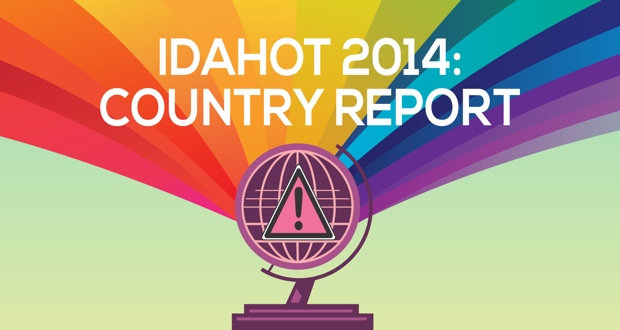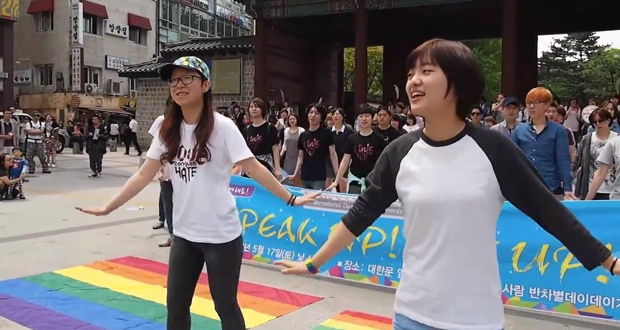Brazil
According to final figures released by ABGLT – the Brazilian national umbrella group for LGBT associations – a total of 183 events were held in Brazil around the International Day Against Homophobia and Transphobia in 2014. Actions were held in at least 20 states, and in at least 55 towns and cities. Once again, this makes Brazil (along with the United Kingdom) one of the most significant national mobilisations around May 17.
A full panorama of all actions held is impossible, and this report will continue to be updated in the coming days, to reflect the scale and diversity of this year’s events. Below is a snapshot, divided by state, of just some of the amazing actions which marked the Day this year in Brazil.
A full list of events held in Brazil this year is available for download here (.doc, 46kb, in Portuguese), with thanks to ABGLT, to Toni, and especially to Paulinho for compiling it.
ABGLT’s May 17 media release, comprising a Manifesto and list of Activities is also accessible via this link (.pdf, 600kb, in Portuguese).
Bahia
Actions around May 17 in the North-Eastern state of Bahia, were significantly larger than any other Brazilian state this year. Commemorations around the Day spread into a month of events during the month of May, and were co-ordinated by a state-wide coalition of over a dozen community groups, civil society organisations and state institutions. For the second year running this run of events – the ‘May of Diversity Project’ – was backed by the SJCDH (State Department of Justice, Citizenship and Human Rights).

On May 19, in honour of the IDAHOT 2014, the Salvador City Legislature held a packed ceremony and public consultation session on sexual orientation and gender identity in policies to promote human rights. The event addressed the need for a national gender recognition act, as well as the labour rights and public security needs of LGBT communities. The event was proposed by the councilor, Florisvaldo Bittencourt (PT). Read the full Portuguese report here.
In the first week of May, the group Juventude Sem Terra – the youth wing of the country’s Landless Worker’s Movement (MST) – organised a march of 3,000 people, in Salvador (pictured). Young activists at the march, affirmed “I’m gay and I’m landless” and that “homophobia exists in the country and in the city”.

In Salvador’s Pelourinho, the show ‘Soul Transformista’ was shown free of charge in commemoration of the Day, on Saturday the 17th. The popular and critically acclaimed piece explores the world of ‘transformistas’ (drag artists), and the difficulties faced by them in trying to maintain the art form, in a city which doesn’t value it. The show was just one of countless cultural and artist events which marked the Day in Bahia this year.

Rio de Janeiro
In Rio de Janeiro, ABGLT held its Fifth National Conference in the city of Niterói on May 22-25. A video introducing the event can be found here:
http://www.youtube.com/watch?v=In7HRB-jJlc
Over 250 people attended the event, representing dozens of organisations from the whole of Brazil. A summary and manifesto from the event – which the organisers called “a historic event in the history of ABGLT” – can be found here (in Portuguese).
To close the event, on the 25th, around 100 participants gathered in Copacabana in Rio de Janeiro city, for a public march and ‘die-in’, to call for the passing of legislation criminalising homophobia.


The exhibition, “Eu te Desafio a me Amar” (I challenge you to love me), by photographer Diana Blok also marked the commemorations in the city, with a special viewing at Amnesty International’s offices. The exhibition – which brings together depictions of LGBT experiences and expressions in contemporary Brazil – was also shown in Brasília. An online catalogue of the exhibition can be found here, and you can find out more about the work of Diana Blok at her website.


The exhibition in Rio de Janeiro also formed part of a broader set of events embracing film screenings and a roundtable discussion on LGBTI freedom of expression worldwide, on SOGI aspects of international human rights activism, and on the emergence of transmasculine communities, and rights demands, in contemporary Brazil. Speakers included Sonia Corrêa (Sexuality Policy Watch), Claire House (IDAHO Committee), Be Neves (UERJ), and Arjen Uijterlinde (Embassy of the Kingdom of the Netherlands in Rio de Janeiro). A recording of the debate is available viw twitcasting here.
São Paulo
In São Paulo, where May 17 is officially recognised as State Day in the Fight Against Homophobia (since a law was passed recognising the Day in 2011), various community groups and state departments came together for a day of reflection and cultural events around LGBT rights.

Co-ordinated by the State Department of Justice and the Defence of Citizenship, the day of events was intended to help promote debate about human dignity, independent of sexual orientation and gender identity. The action was supported by various other actors and institutions including gender and racial equality departments, and the Brazilian Lawyares Association (OAB).
“The date is important to call attention to the need for affirmative policies to confront homophobia and transphobia – discrimination suffered by travestis and transsexuals… The fight against prejudice is a daily struggle, but on this date we get to raise public awareness that we need to have concrete actions which reduce indices of criminality which are still persist against LGBT communities.” – Heloisa Gama Alves, Co-ordinator of Policies of Sexual Diversity in São Paulo.
Minas Gerais
Activists and supporters from the city’s LGBT community came together for a march in the centre of the state capital, Belo Horizonte, on Saturday May 17. Activists called for public policies to guarantee community safety, promote health and education, and a call for laws to promote equal rights. Organisers underscored that on May 10, 2014, two travestis in the Pampulha region of the city were killed in hate motivated attacks. And that, already in 2014, 136 lives have been taken through hate crimes targeting the LGBT community in Brazil – which remains a global “leader” for lethal LGBT hate crimes.



